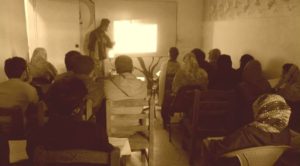On January 21, 2017 I arranged an organic chemistry workshop for 2nd year intermediate students. It was the 3 hours workshop which covers the most important topics of session 2017-2018.

The purpose of this organic chemistry workshop was to entertain mostly those students who finds an organic chemistry a difficult subject and for part time students as well.
Here are some the glimpses of the organic chemistry workshop:

What is organic chemistry?
Organic chemistry is the branch of chemistry that involves studying the “physical and chemical properties of hydrocarbons”.
In general, the word “hydrocarbon” is preferred to the word “organic” in modern science.
This is because in the early days of chemistry, all living things were considered to be composed of CARBON and HYDROGEN (VFT).
Then a German scientist MR. WOHLER accidentally breaks this myth.
Today our 90% source of organic compounds comes from a synthetic source.

What are the best ways to study organic chemistry?
I love organic chemistry, I have just completed my second course and am getting used to it.
I don’t know what you have in general chemistry, but I assume you have an idea of the basics such as electronegativity, covalent and ionic bonds, hydrogen bonds, isomers, etc.
In my opinion, the first things you need to study:
The reactivity of each functional group. That is the most important point. You can predict reactivity by knowing how resonance is drawn and interpreted (with the exception of numerous exceptions).
For example:
Ketones, Aldeydes: The main features of these compounds are an electrophilic carbon atom and an acidic alpha carbon (pka = 20), which can be easily deprotonated.
Acyl halides: Carbonyl carbon reacts more reactively to the nucleophilic approach because the molecule contains a really electronegative atom.
Alkane: All bonds are non-polar covalent bonds, so they usually only react under drastic conditions.
These are just a few examples, but you should be able to do the same for each function group.
Nucleophilic and electrophilic molecules. As my professor said, all reactions can be summarized in a simple model: an electron-rich molecule that approaches an electron-deficient molecule.
Acid-base reactions. If you know how an acid-base reaction works, you can easily predict where the reaction will go.
Now you can start with the basic reactions every time to understand why the mechanism is so (information above). If you follow these steps, you will find that organic chemistry is not just about memorizing.
What I’ve written so far is just the tip of the giant iceberg called organic chemistry.
If we scratch below the surface, we find the world of stereochemistry, in which the spatial arrangement of the atoms that make up the structure of the molecules is examined.
A good organic chemist should know not only the products, but also the stereochemistry of the products.
I cannot say that this is all because I am still on the way to deeply understanding this incredible subject. Hope this helps with your doubts.
(Sorry for grammar or spelling mistakes)
P.S. If you want to know, I’m studying in this great book “Advanced Organic Chemistry Part B by Carey, Sundberg“.
